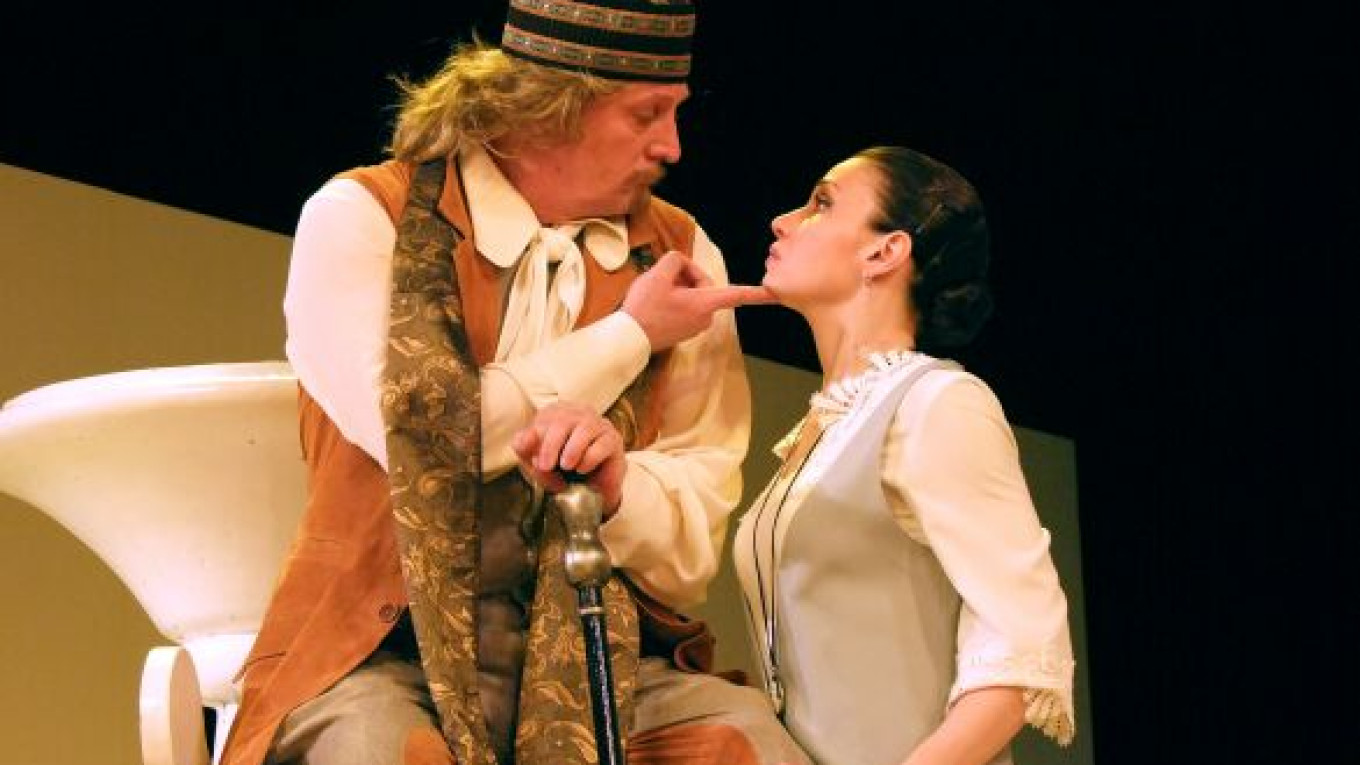Roman Kozak’s production of Alexander Ostrovsky’s “Mad Money” at the Pushkin Theater was his last. Twenty days after the show opened in early May he died following a prolonged battle with cancer. He was 52 years old.
I attended “Mad Money” hours after Kozak was eulogized and buried on Sunday. It was a long, hard day, most of all for the actors who served as pallbearers and eulogizers, then went on stage to play a raucous comedy.
The fact that they did it with ease and vigor was a testament to them and their director.
Knowing he was dying as he rehearsed “Mad Money,” Kozak infused this show with an extraordinary light touch. This is Ostrovsky played as if he were Moliere, as if “Mad Money” were a farce by Eugene Scribe or Georges Feydeau.
The hard-edged comedy is peopled with liars, profligates and gold diggers who run up against an honest man, the sensible and moderately wealthy Savva Vasilkov. Usually Vasilkov is interpreted as a boring, gray type who may be right in what he does but doesn’t have half the charisma of the shysters circling around him.
Kozak changed that entirely, casting the warm and lovable Ivan Urgant as Vasilkov, and making him a dreamer and visionary. This is someone who always imagines that the world could be better if only a little more thought were put into it.
Urgant first appears wearing a bizarre flying machine attached to his shoulders. With a crank at his side, he revs up a clunky propeller that twists above his head.
Kozak makes little of this comical contraption. At one point Vasilkov’s ungrateful wife Lidia (Alexandra Ursulyak) ridicules her husband by mocking the action of cranking the propeller. But otherwise it is an eccentric image that the audience is free to interpret as it wishes.
Even stranger and more whimsical is a mechanical dog that scampers across the stage three or four times. It has no use whatsoever except to amuse and delight. And in that lies its deeply important significance: to remind us that life’s richest moments arise in the absurd and unexpected.
Each of the swindlers stalking Vasilkov exists in his own odd world.
Ivan Telyatev (Viktor Verzhbitsky) appears to be a comically dashing escapee from a Lope de Vega play or an Alexandre Dumas novel. Grigory Kuchumov (Nikolai Fomenko) is an infantile lady-killer who is as afraid of women as he is attracted to them. Yegor Glumov (Boris Dyachenko) is a modern-style intriguer who looks like he might keep track of his swindles on a calendar app on his Blackberry or iPhone.
The focal point of everyone in Kozak’s production is Ursulyak’s Lidia. She is beautiful, sexy and smart. Moreover, she knows that and knows that this is her ticket to a life of luxury. She never hesitates to play the seduction game on anyone when a bit of cash is in the offing.
Ursulyak plays Lidia as if she were a high-class prostitute. She marries Vasilkov for his money, but it never occurs to her that he won’t just shower her with cash whenever she wishes it.
Kozak builds the story simply and clearly, as if each character were a mask from the commedia dell’arte. In fact he occasionally has the actors stop in frozen poses as they hold half-masks in front of their faces. It is as if these are not real people, but historical, social and cultural functions — an entire class of individuals who use money, chase it, squander it, borrow it, lend it, but never do anything of value with it.
Ursulyak is superb as Lidia. She never shies from painting her character in the harshest, least advantageous light, and yet never for a moment ceases to be anything less than irresistible.
The space designed by Igor Popov provides a suggestion of elegance — movable white walls punctuated with graceful archways that surround a faux-marble well and provide ample room for the characters to ride around on elaborate carriages and bikes.
Kozak slowed the roaring, lightly skipping comic machine only in the final scenes. Here, rather unexpectedly, the dreamer emerges as a man of substance and the rogues are revealed to be sad and vulnerable.
This does not resolve the tension between the warring parties. Kozak demonstratively left that in place. It is as if he wished to suggest that there will always be room for a few laughs and dreams, even if the world will probably never change.
“Mad Money” (Besheniye Dengi) plays Wednesday and May 10 at 7 p.m. at the Pushkin Theater, located at 23 Tverskoi Bulvar. Metro Pushkinskaya. Tel. 694-1289, www.teatrpushkin.ru. Running time: 3 hours, 25 minutes.
A Message from The Moscow Times:
Dear readers,
We are facing unprecedented challenges. Russia's Prosecutor General's Office has designated The Moscow Times as an "undesirable" organization, criminalizing our work and putting our staff at risk of prosecution. This follows our earlier unjust labeling as a "foreign agent."
These actions are direct attempts to silence independent journalism in Russia. The authorities claim our work "discredits the decisions of the Russian leadership." We see things differently: we strive to provide accurate, unbiased reporting on Russia.
We, the journalists of The Moscow Times, refuse to be silenced. But to continue our work, we need your help.
Your support, no matter how small, makes a world of difference. If you can, please support us monthly starting from just $2. It's quick to set up, and every contribution makes a significant impact.
By supporting The Moscow Times, you're defending open, independent journalism in the face of repression. Thank you for standing with us.
Remind me later.


